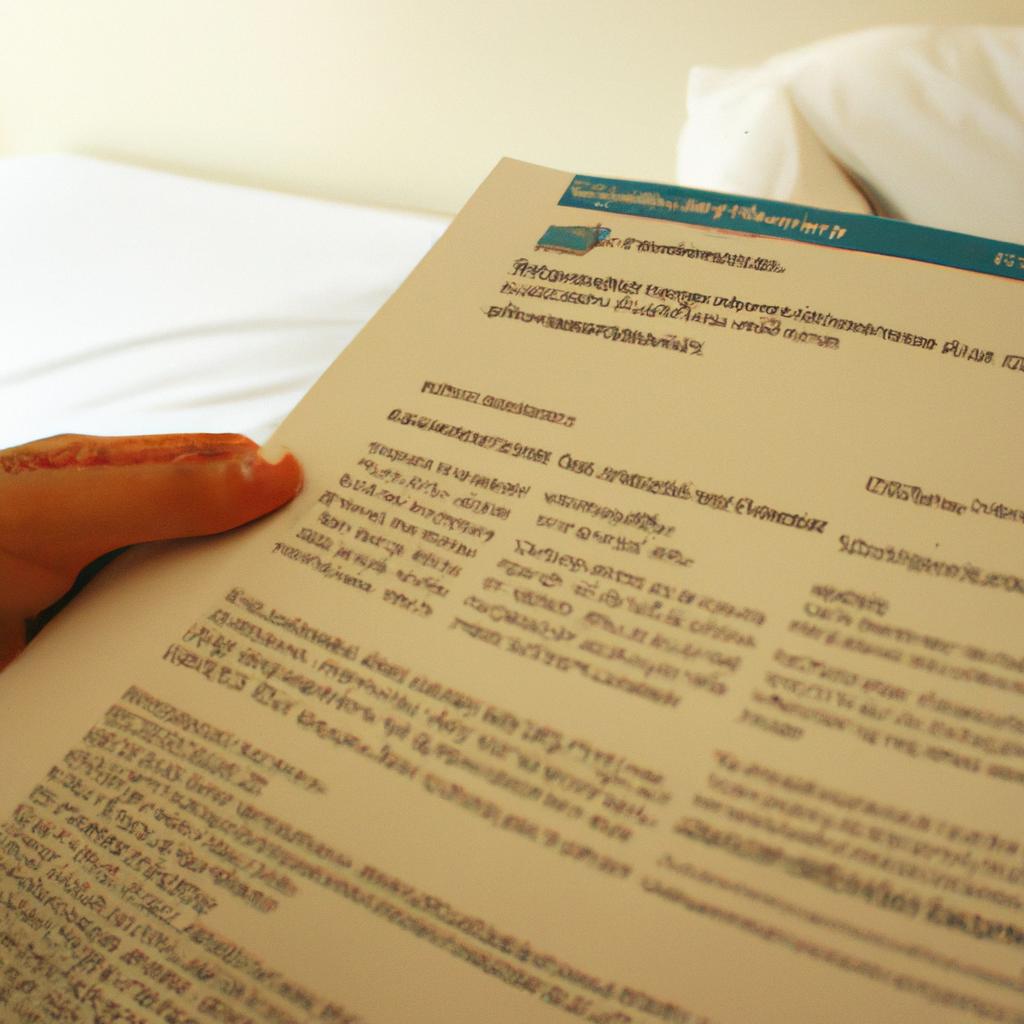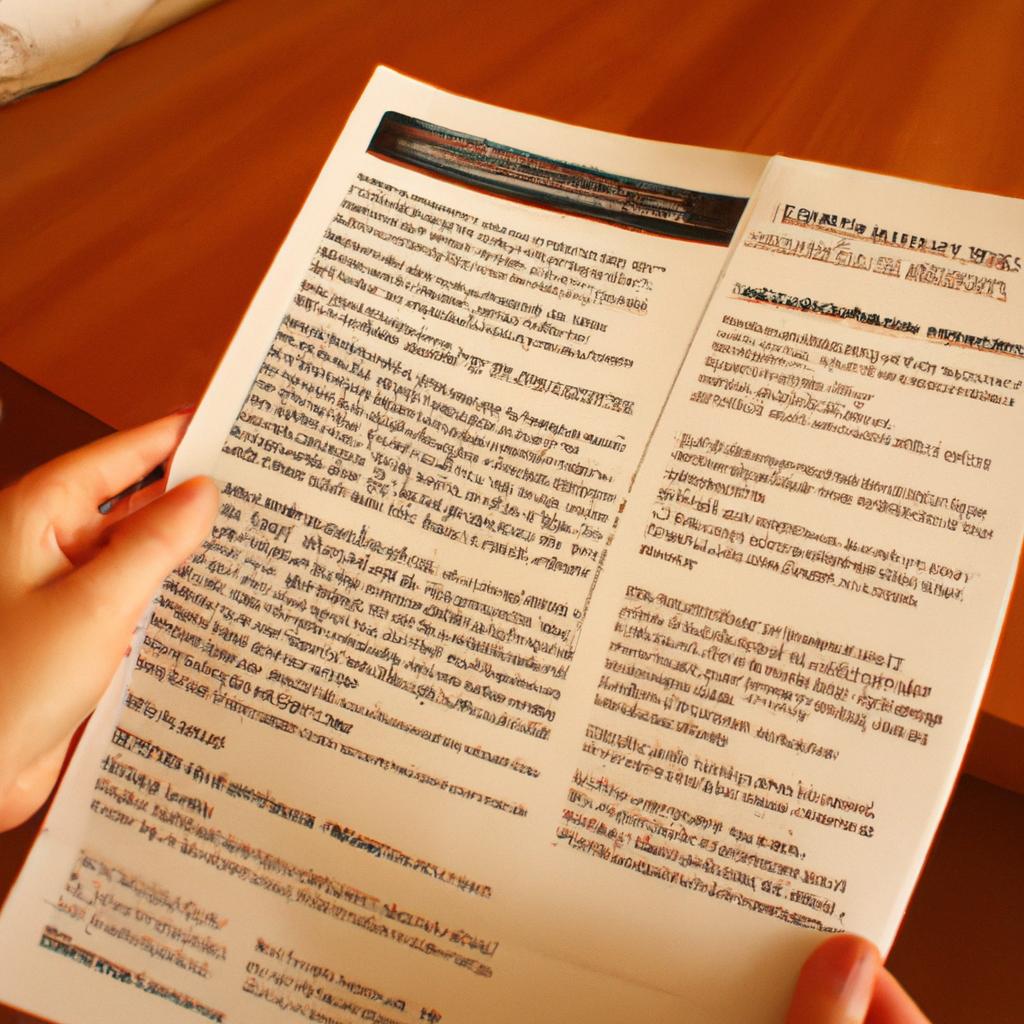Hotel Refund Policy: Exploring the Cancellation Policy
In today’s fast-paced world, travel plans can often change at a moment’s notice. Whether it be due to unforeseen circumstances or simply a change of heart, travelers frequently find themselves needing to cancel their hotel reservations. However, navigating the intricate web of hotel refund policies and cancellation fees can be a daunting task for even the most seasoned traveler. Therefore, this article aims to delve into the complexities surrounding hotel refund policies, shedding light on common practices and providing valuable insights for travelers seeking clarity.
To illustrate the importance of understanding hotel refund policies, let us consider an example scenario. Imagine a business professional who has diligently planned a week-long conference in another city. After booking accommodations at a reputable hotel well in advance, unexpected work obligations arise that force them to cancel their trip entirely. The individual is now faced with the dilemma of potentially losing a significant amount of money due to strict cancellation policies imposed by hotels. This case study serves as a reminder that comprehending these policies before making reservations is crucial in order to mitigate financial risks and make informed decisions when unforeseen circumstances occur.
Understanding the Refund Process
Consider this scenario: John, a traveler visiting a new city for business purposes, books a hotel room in advance. Unfortunately, due to unforeseen circumstances, he is forced to cancel his reservation at the last minute. In situations like these, understanding the refund process becomes crucial for travelers.
When it comes to hotel cancellations and refunds, each establishment has its own policies in place. These policies outline the terms and conditions under which guests can receive a full or partial refund of their booking amount. For instance, some hotels may have flexible cancellation policies that allow guests to cancel up until 24 hours before check-in without any penalty. However, other establishments might enforce stricter policies where cancellations made within a certain time frame result in charges being incurred.
To shed light on this matter further, we will explore four important aspects of the hotel refund process:
- Cancellation Deadlines: Different hotels set specific deadlines by which reservations must be canceled if guests wish to receive a refund. Missing these deadlines often means forfeiting the entire booking cost or incurring penalties.
- Partial Refunds: Some hotels offer partial refunds based on when cancellations are made. For example, cancelling within 48 hours of check-in might lead to a smaller percentage of the total amount being refunded compared to cancelling several days prior.
- Non-Refundable Bookings: Certain hotels also provide non-refundable options for guests who prioritize lower rates over flexibility. With non-refundable bookings, even if circumstances change unexpectedly, guests do not qualify for any monetary reimbursement.
- Exceptions and Special Circumstances: Hotels sometimes make exceptions for extenuating circumstances such as medical emergencies or natural disasters. In such cases, they may offer full refunds or alternative arrangements out of goodwill.
To illustrate these points visually:
| Aspect | Impact | Emotional Response |
|---|---|---|
| Cancellation Deadlines | Loss of money | Frustration, disappointment |
| Partial Refunds | Inadequate reimbursement | Dissatisfaction, annoyance |
| Non-Refundable Bookings | No reimbursement | Regret, frustration |
| Exceptions | Compassionate customer service | Gratitude, relief |
Understanding the refund process is essential for travelers to manage their expectations and make informed decisions. By familiarizing themselves with the hotel’s cancellation policy before making a reservation, guests can avoid any potential disappointments or financial losses.
Moving forward, we will explore the factors that determine whether a guest is eligible for a refund in our next section on “Factors Affecting Refund Eligibility.” This understanding will further assist travelers in navigating through the complexities of hotel cancellations.
Factors Affecting Refund Eligibility
To fully understand a hotel’s refund policy, it is essential to consider the factors that can affect one’s eligibility for a refund. Let us explore some of these key factors in detail. To provide context, imagine a scenario where a traveler books a room at a luxurious beachfront resort but is unexpectedly unable to make the trip due to unforeseen circumstances.
Cancellation Window:
Most hotels have specific cancellation windows within which guests must cancel their reservation to be eligible for a full or partial refund. These timeframes vary from property to property and are typically outlined in the hotel’s terms and conditions. In our case study, let’s assume this particular resort allows cancellations up to 72 hours before check-in without any penalties.
Occupancy Rate:
Another crucial factor influencing refund eligibility is the occupancy rate at the hotel during the desired stay dates. If demand is high and rooms are scarce, hotels may enforce stricter cancellation policies as they rely on maximizing revenue through guaranteed bookings. Conversely, during off-peak periods when there are plenty of available rooms, hotels may offer more lenient cancellation policies to attract bookings.
Seasonal Policies:
Certain hotels implement seasonal policies that impact refund eligibility based on peak travel seasons or special events happening in the area. For example, during major holidays or festivals when demand surges, hotels might require longer notice for cancellations or exclude refunds altogether. It is important for travelers to be aware of such seasonal variations and plan accordingly.
Extra Services and Packages:
Refund policies can also differ depending on whether guests have availed themselves of additional services or packages beyond basic accommodation. Some hotels may have separate cancellation rules for spa treatments, dining reservations, or bundled deals like “all-inclusive” packages. Guests should carefully review these details beforehand to avoid surprises later.
Emotional Response (Bullet Point List):
When faced with unexpected changes in travel plans, understanding how various factors influence refund eligibility can evoke different emotional responses. Here are some common emotions that travelers may experience:
- Frustration: Discovering a strict cancellation policy after unforeseen circumstances arise
- Relief: Finding out the hotel offers a flexible refund policy within the traveler’s required timeframe
- Disappointment: Realizing a booking falls under a seasonal policy with limited or no refund options
- Satisfaction: Appreciating transparent and clearly communicated cancellation terms
Emotional Response (Table):
| Emotion | Trigger |
|---|---|
| Frustration | Strict cancellation policies |
| Relief | Flexible refund options |
| Disappointment | Limited or no refunds due to seasonal policies |
| Satisfaction | Clear and transparent communication of cancellation terms |
Understanding the factors influencing refund eligibility is crucial, but it is equally essential for travelers to be aware of timelines associated with cancellations and refunds.
Section Transition Sentence:
Now let us explore the timelines for cancellation and refunds at hotels.
Timelines for Cancellation and Refunds
Exploring the Cancellation Policy: Timelines for Cancellation and Refunds
Consider this hypothetical scenario: Jane, a frequent traveler, books a hotel room for her upcoming vacation. Unfortunately, due to unforeseen circumstances, she needs to cancel her reservation. In such situations, understanding the timelines associated with cancellations and refunds becomes crucial. This section will delve into the specific timeframes within which hotels typically allow cancellations and process refunds.
When it comes to cancellation timelines, hotels often have varying policies depending on factors such as booking type, seasonality, and promotional offers. It is essential for travelers like Jane to be aware of these timelines to avoid any potential inconveniences or financial losses. Typically, hotels require guests to cancel their reservations within a specified number of days before check-in to qualify for a refund. For example:
-
Standard Booking:
- Cancellation made 24 hours prior to check-in: Full refund.
- Cancellation made less than 24 hours prior to check-in: No refund.
-
Non-Refundable Booking:
- Cancellation made at any time: No refund.
-
Advanced Purchase/Prepaid Booking:
- Cancellation made within the designated timeframe (e.g., 7 days): Partial or full refund.
- Cancellation made outside the designated timeframe: No refund.
-
Promotional Offer:
- Cancellation terms may vary based on the specific promotion; refer to the terms and conditions provided by the hotel during booking.
To better illustrate these guidelines visually, consider the following table showcasing different cancellation scenarios and their corresponding outcomes:
| Booking Type | Timeframe | Refund Eligibility |
|---|---|---|
| Standard | <24 hours before check-in | No refund |
| Non-Refundable | Anytime | No refund |
| Advanced Purchase | Within designated timeframe | Partial or full refund depending on policy |
| Promotional Offer | Varies | Refer to terms and conditions |
Understanding the cancellation timelines is vital as it allows travelers to make informed decisions regarding their reservations. By familiarizing themselves with these policies, individuals like Jane can effectively manage any changes in their plans while minimizing potential financial implications.
Transitioning seamlessly into the subsequent section about “Exceptions to the Refund Policy,” it is important to note that despite general guidelines, hotels may have specific exceptions when it comes to cancellations and refunds. These exceptions could be influenced by factors such as force majeure events, medical emergencies, or other unforeseen circumstances beyond a traveler’s control. Let us explore these exceptional cases further in the upcoming section.
Exceptions to the Refund Policy
Exploring the Cancellation Policy
Transition from previous section H2: Timelines for Cancellation and Refunds
Now that we have discussed the various timelines associated with cancellations and refunds, let us delve into the exceptions to the refund policy. To illustrate this further, consider a hypothetical scenario where a traveler has booked a hotel room for a week but is unexpectedly called away due to an urgent matter after only two nights of stay. In such cases, it becomes crucial to understand the exceptions that may apply to the standard refund policy.
When it comes to hotel cancellation policies, there are several factors that can affect whether or not a refund will be granted. The following bullet points outline some common scenarios:
- Medical emergencies: If you or someone in your travel party experiences an unforeseen medical emergency before or during your stay, many hotels offer flexibility in their cancellation policies.
- Natural disasters: In case of natural disasters such as hurricanes, earthquakes, or severe weather conditions that prevent travel or pose risks to personal safety, hotels often provide full refunds.
- Flight disruptions: When flights are canceled or delayed due to airline issues (e.g., strikes) beyond your control, certain hotels may waive cancellation fees as they understand the circumstances were out of your hands.
- Hotel-specific policies: Some hotels have unique policies based on their location or target market. For instance, resorts located in tropical destinations might have specific guidelines regarding hurricane seasons and corresponding refund options.
| Scenario | Refund Eligibility |
|---|---|
| Medical Emergency | Full refund |
| Natural Disaster | Full refund |
| Flight Disruptions | Partial/Full refund |
| Hotel-Specific Policies | Varies |
Understanding these exceptions helps travelers make informed decisions when faced with unexpected circumstances. By familiarizing yourself with the hotel’s cancellation policy and investigating any potential exceptions, you can ensure a smoother experience in case of unforeseen events.
Transition to subsequent section H2: Tips for Avoiding Cancellation Fees
Now that we have explored the different aspects of the hotel refund policy, let us delve into some useful tips that can help you avoid unnecessary cancellation fees.
Tips for Avoiding Cancellation Fees
Exploring the Cancellation Policy: Exceptions to the Refund Policy
In certain circumstances, hotels may make exceptions to their refund policy. These exceptions are typically outlined in detail within the hotel’s cancellation policy. Let us consider a hypothetical case study to understand some common scenarios where exceptions might apply.
Imagine you have booked a luxurious suite at a beachfront resort for a week-long vacation. Unfortunately, on the day of your departure, severe weather conditions prevent you from being able to travel safely to your destination. In such cases, many hotels offer refunds or allow rescheduling without penalty due to unavoidable circumstances like natural disasters or extreme weather events.
Exceptions can also be made for medical emergencies that arise unexpectedly and prevent guests from traveling. If a guest falls ill or is involved in an accident before their scheduled arrival date, most hotels will consider providing a refund or allowing rescheduling upon presentation of appropriate documentation such as medical certificates.
It is important to note that each hotel has its own set of rules regarding exceptions and proof required for eligibility. However, here are some general situations where hotels commonly provide exemptions:
- Government-imposed travel restrictions or border closures
- Death or serious illness of an immediate family member
- Sudden job loss resulting in financial hardship
- Unforeseen military deployment or call-to-action
To further understand how various factors impact refund policies across different establishments, refer to the following table:
| Situation | Refund Eligibility | Rescheduling Options |
|---|---|---|
| Natural disaster | Full refund | Reschedule without extra charges |
| Medical emergency | Partial/full refund | Option to reschedule without penalty |
| Travel restrictions/border closures | Full refund | Opportunity to rebook at later dates |
| Immediate family death/illness | Partial/full refund | Extended time frame for future stays |
These examples highlight instances where hotels may make exceptions to their refund policy, demonstrating their consideration for unforeseen circumstances that can disrupt travel plans. By understanding these exceptions, guests can better navigate the cancellation process and approach hotels with valid claims.
Transitioning into the next section on “How to Request a Refund,” it is essential to familiarize yourself with the hotel’s specific policies and procedures in order to effectively communicate your situation and maximize your chances of obtaining a refund or rescheduling your reservation.
How to Request a Refund
Exploring the Cancellation Policy: Tips for Avoiding Cancellation Fees
In order to navigate a hotel’s refund policy effectively, it is important to understand the cancellation policy in place. This section will provide insights into how you can avoid cancellation fees and make informed decisions when booking accommodations.
To illustrate this, let us consider a hypothetical scenario involving a traveler named Sarah. Sarah had booked a hotel room for her vacation but unexpectedly fell ill before her departure date. She needed to cancel her reservation due to health concerns and wanted to minimize any potential financial losses.
One effective way of avoiding cancellation fees is by planning your trip well in advance. By doing so, you are more likely to have ample time within the hotel’s specified cancellation window to modify or cancel your reservation without being penalized. Additionally, paying attention to the specific terms and conditions of the hotel’s cancellation policy can help you determine whether there are any exceptions or flexible options available.
Here are some practical tips that can assist you in avoiding cancellation fees:
- Familiarize yourself with the hotel’s cancellation policy before making a reservation.
- Opt for hotels that offer free cancellations up until a certain date or time.
- Consider booking through platforms that provide flexible booking policies, such as those offering no-penalty cancellations within a designated timeframe.
- Purchase travel insurance that covers trip cancellations due to unexpected circumstances.
Ways to Minimize Financial Losses Due to Cancellations:
- Decrease stress levels associated with last-minute changes
- Maintain peace of mind while planning trips
- Allocate saved funds towards other aspects of your journey
- Preserve overall satisfaction and enjoyment during travels
Furthermore, understanding how different hotels handle cancellations can be beneficial. The following table provides an overview of common types of cancellation policies employed by hotels:
| Cancellation Policy Type | Description | Advantages | Disadvantages |
|---|---|---|---|
| Flexible | Allows cancellations up to a specified time before the reservation date without penalties. | Provides peace of mind and flexibility for changing travel plans. | May have higher initial cost or limited availability due to popularity. |
| Moderate | Permits cancellations within a certain timeframe, usually with minimal fees or partial refunds. | Offers some flexibility while still imposing minor financial consequences. | May restrict changes close to the reservation date, resulting in moderate cancellation fees. |
| Strict/Non-refundable | Does not allow any cancellations or provides very limited refund options after booking confirmation. | Generally offers lower rates upfront for those confident in their travel plans. | Imposes heavy financial penalties if unforeseen circumstances arise. |
In conclusion, by understanding hotel cancellation policies and employing strategies such as planning ahead, opting for flexible bookings, purchasing insurance, and being aware of different policy types, travelers like Sarah can navigate the refund process more effectively and avoid unnecessary cancellation fees.
 Cedars Inn Auburn
Cedars Inn Auburn



